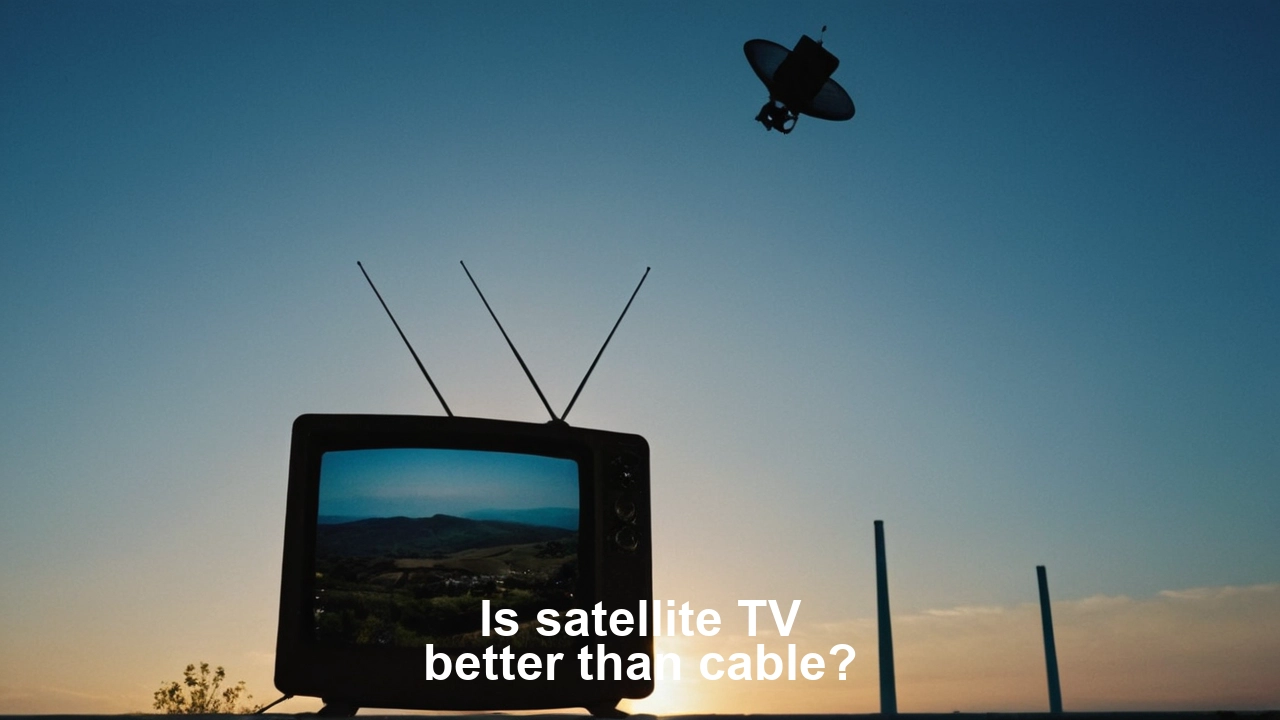Is satellite TV better than cable?
Is satellite TV better than cable?
Choosing between satellite TV and cable TV can be a daunting task, especially with the numerous options and features available today. Both satellite and cable TV have their unique advantages and disadvantages. In this blog post, we'll delve into a detailed comparison of these two services to help you make an informed decision.
Picture Quality
Satellite TV: Satellite TV generally offers better picture quality compared to cable TV. This is because satellite TV signals are transmitted in digital format, ensuring a clearer and more vibrant picture. High-definition (HD) and ultra-high-definition (UHD) channels are widely available on satellite TV, providing viewers with an immersive viewing experience.
Cable TV: While cable TV also offers HD and UHD channels, the picture quality can sometimes be affected by the distance from the provider's central office and the number of users on the network. This can result in signal degradation and lower picture quality.
Verdict: Satellite TV wins in terms of picture quality.
Channel Availability
Satellite TV: Satellite TV providers typically offer a wide range of channels, including international and niche channels. This makes satellite TV a great option for viewers who want access to a diverse selection of content.
Cable TV: Cable TV providers also offer a variety of channels, but their selection may not be as extensive as satellite TV. However, cable TV providers often bundle their services with other offerings like internet and phone services, which can be appealing to some customers.
Verdict: Satellite TV has an edge in channel availability, but cable TV may offer more attractive bundle deals.
Reliability
Satellite TV: One of the main drawbacks of satellite TV is its susceptibility to weather conditions. Heavy rain, snow, or strong winds can interfere with the satellite signal, causing interruptions or loss of service.
Cable TV: Cable TV is generally more reliable than satellite TV as it is less affected by weather conditions. However, cable TV can still experience outages due to technical issues or maintenance work.
Verdict: Cable TV is more reliable, especially in adverse weather conditions.
Installation and Equipment
Satellite TV: To get satellite TV, you'll need to install a satellite dish and a compatible receiver. The dish needs to be placed in a location with a clear view of the southern sky (for the Northern Hemisphere) or the northern sky (for the Southern Hemisphere). Installation can be more complex and may require professional help.
Cable TV: Cable TV installation is typically more straightforward. It involves connecting the cable line to a set-top box or directly to your TV. Most cable providers offer self-installation kits, making the process easier for customers.
Verdict: Cable TV is easier to install and requires less equipment.
Cost
Satellite TV: Satellite TV providers usually offer competitive pricing and various packages to suit different budgets. However, the cost of equipment (satellite dish and receiver) and installation fees can add to the initial expense.
Cable TV: Cable TV can be more expensive, especially when bundling with other services like internet and phone. However, many providers offer promotional deals and discounts to attract new customers.
Verdict: Satellite TV may have a lower monthly cost, but initial expenses can be higher. Cable TV may offer better deals through bundling.
Coverage
Satellite TV: Satellite TV has a significant advantage when it comes to coverage. It can be accessed in remote and rural areas where cable TV may not be available. This makes satellite TV a great option for viewers in areas with limited infrastructure.
Cable TV: Cable TV is more commonly available in urban and suburban areas. However, it may not be accessible in remote or rural locations.
Verdict: Satellite TV wins in terms of coverage, especially in remote areas.
Interactive Features
Satellite TV: Satellite TV providers often offer interactive features like on-demand content, digital video recording (DVR), and interactive guides. These features enhance the viewing experience and provide more control over what you watch and when.
Cable TV: Cable TV also offers similar interactive features, including on-demand content and DVR services. Some cable providers have advanced features like voice control and integration with smart home devices.
Verdict: Both satellite and cable TV offer robust interactive features, so it's a tie.
Conclusion
In conclusion, whether satellite TV is better than cable TV depends on your specific needs and preferences. Here's a quick summary of the key points:
-
Picture Quality: Satellite TV generally offers better picture quality.
-
Channel Availability: Satellite TV provides a wider range of channels.
-
Reliability: Cable TV is more reliable, especially in bad weather.
-
Installation and Equipment: Cable TV is easier to install and requires less equipment.
-
Cost: Satellite TV may have a lower monthly cost, but initial expenses can be higher. Cable TV may offer better deals through bundling.
-
Coverage: Satellite TV has better coverage in remote areas.
-
Interactive Features: Both services offer similar interactive features.
Ultimately, the choice between satellite TV and cable TV depends on what you value most—whether it's picture quality, channel selection, reliability, ease of installation, cost, coverage, or interactive features. Consider your individual needs and preferences to make the best decision for your household.
Upgrade your TV experience now! Call (469) 213-7481 to explore satellite TV options tailored for you.


